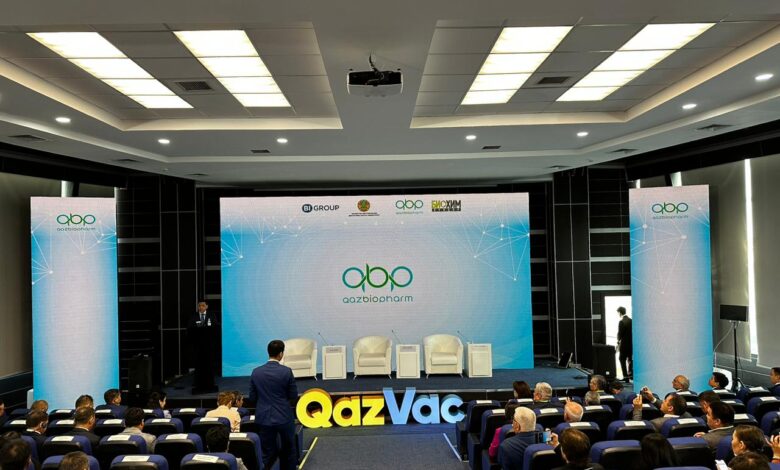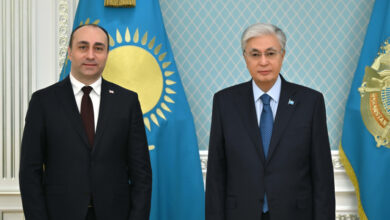
On May 29, 2023, the International Forum “Lessons of the Pandemic: Kazakhstan’s Experience” (hereinafter referred to as QazBioPharm) began in Astana. The forum aims to preserve the institutional memory of measures taken to overcome pandemic threats, specifically the COVID-19 coronavirus infection, and to popularize the effective activities of governmental and non-governmental organizations and scientific institutions in ensuring biological security during the pandemic, Turanews.kz reports.
The International Forum “Lessons of the Pandemic: Kazakhstan’s Experience” started with the presentation of the documentary and journalistic book titled “QazVaC: TAITALAS”. This book is dedicated to the achievements of Kazakh scientists who developed a domestic vaccine during the fight against the pandemic of the coronavirus infection.
It is worth noting that the program of QazBioPharm involves the participation of high-level officials from various governmental bodies, parliamentarians, representatives of international organizations, leading scientists, prominent public figures, and business representatives.
Welcoming remarks were delivered by Deputy Prime Minister of the Republic of Kazakhstan A. Kulginov, Senator of the Parliament of the Republic of Kazakhstan A. Alnazarova, Senator of the Parliament of the Republic of Kazakhstan A. Aimagambetov, Minister of Science and Higher Education of the Republic of Kazakhstan S. Nurbek, Chairman of the Board of Directors of National Holding QazBioPharm B. Saparbayev, and President of the Board of the National Academy of Sciences of the Republic of Kazakhstan under the President of the Republic of Kazakhstan K. Zakarya.
“Allow me to welcome you to Astana, the capital of Kazakhstan. In this hall, representatives of government bodies, the diplomatic corps, authoritative international organizations, the international scientific community, and business structures have gathered. I would like to express special gratitude to our foreign guests! It is deeply symbolic that the Forum is taking place in Kazakhstan, a country that has joined the ranks of the few nations developing its own COVID-19 vaccine, ‘QazVac.’
Kazakhstan has developed a unique comprehensive system for assessing and predicting the epidemiological situation during the pandemic, along with a set of restrictive measures. This model has been approved by the World Health Organization’s representation in Kazakhstan and has also been adapted by EU countries and highly praised by neighboring states.
Our victory is the result of the combined efforts not only of brave doctors and microbiologists but also the coordinated work of government agencies, the support of the business community and our citizens.
The President of the country, Kassym-Jomart Tokayev, pays special attention to the development of biotechnology and biopharmaceuticals in Kazakhstan, as he has repeatedly emphasized in his speeches. The first large-scale full-cycle biopharmaceutical plant in the Republic of Kazakhstan was built on his initiative and a year ago, the National Holding ‘QazBioPharm’ was established.
So much has been done and even more remains to be done. We value the experience of other countries and are open to dialogue. The opinions of the Forum participants – distinguished scientists in the field of biotechnology and biological security – will be invaluable to us,” Deputy Prime Minister of the Republic of Kazakhstan Altai Kulginov said.
“Dear forum participants, over the past 3-4 years, the world has experienced a very challenging situation. It is no coincidence that comparing the COVID-19 pandemic to the ‘third world war’ signifies that millions of people have lost their lives, causing tremendous damage to the economy and society. The rapid development and widespread transmission of the virus have put certain industries in crisis, revealed weaknesses in the healthcare system, and highlighted issues in ensuring population safety during the spread of infectious diseases, while also demonstrating the most effective measures to combat the infection. Overall, the pandemic has changed the familiar way of life for humanity.
During the pandemic, at the direction of President of the Republic of Kazakhstan Kassym-Jomart Tokayev, we initiated the development of multiple candidate vaccines against the coronavirus on five platforms. These include the inactivated vaccine QazVac, subunit vaccine, two recombinant vaccines, and a live vaccine.
Esteemed colleagues, the pandemic caused by the coronavirus outbreak has shown that effective protection against such trials can only be achieved if every sector of society serves a common goal together.
Where there is life, there are epidemics. For example, just recently, at the annual assembly held on May 23 in Geneva, representatives of the World Health Organization reported that humanity faces a new, more harmful pandemic than COVID.
Therefore, in the future, we must be prepared to confront any threat. I believe that the question of what lessons we have learned from the COVID-19 pandemic and what specific steps need to be taken to protect ourselves in the future will be thoroughly discussed by the participants and experts of today’s forum,” President of the Board of the National Academy of Sciences of the Republic of Kazakhstan under the President of the Republic of Kazakhstan Kunsulu Zakarya said.
“The Ministry of Science and Higher Education of the Republic of Kazakhstan is deeply committed to the protection of the health and well-being of our people. From 2020 to 2022, around 30 competitions for scientific research were conducted, resulting in the implementation of 1,507 projects under grant financing and 103 scientific and technical programs under program-targeted financing. Among them, 6 scientific and technical programs and 49 grant projects were carried out with the participation of scientists from subsidiary organizations of the National Holding QazBioPharm. As a result of the implementation of scientific projects, specific diagnostic tools for detecting causative agents of current infections, medicines, and preventive preparations, including vaccines against coronavirus infection, have been developed. Among them, the first Kazakhstani vaccine against coronavirus, QazVac, was developed by Holding scientists in a record short time (47 days). The safety and high immunogenicity of the vaccine have been proven through clinical trials. The results of clinical research have been published in two articles in the reputable journal EClinicalMedicine, which is part of The Lancet group and has a high rating. As noted by the developers, the QazVac vaccine was recommended by the World Health Organization for use in August 2021. According to the Ministry of Health of the Republic of Kazakhstan, as of May 2023, more than 5.5 million people have received the QazVac vaccination.
Within the framework of the Science and Technology Program of the Ministry of Science and Higher Education of the Republic of Kazakhstan, several more vaccines against COVID-19 have been developed. The subunit vaccine QazCoVac-P has undergone two phases of clinical trials with good results. In addition, two vector vaccines based on the influenza virus vector and a live attenuated vaccine have been developed. We believe that the research results of the Holding’s scientists represent breakthrough achievements not only for Kazakhstani science but also for the whole world. The authorized body for science in Kazakhstan has provided domestic scientists with all necessary resources for scientific research and development in a timely manner and has also contributed to the dissemination of information on health protection measures and disease prevention.
I would also like to mention that during the pandemic, the Ministry provided support in the development of distance learning technologies and the organization of online courses for university students to ensure their health safety and break the chains of infection transmission.
We are confident that our work and contribution to the development of science and education in the Republic of Kazakhstan will help improve the quality of life of our citizens and ensure their health during any challenges and trials. We will continue to work for the benefit of our country and our people and do everything possible to protect the health and well-being of our citizens.” Minister of Science and Higher Education of the Republic of Kazakhstan Sayasat Nurbek said.
Let’s note that QazVac is a vaccine developed by scientists from the Research Institute for Biological Safety Problems for the prevention of COVID-19. It is based on the technology of inactivated viruses, which involves the use of chemicals to inactivate the SARS-CoV-2 virus. After the vaccine is administered into the body, the immune system starts producing antibodies that can protect against infection in case of contact with the virus.
Clinical trials of the QazVac vaccine were conducted in Kazakhstan in 2020 on 3,000 volunteers aged between 18 and 85 years. According to the research data, the vaccine demonstrated an efficacy of over 90% in preventing COVID-19.
QazVac vaccine was approved by the Ministry of Health of the Republic of Kazakhstan and recommended by the World Health Organization for use in August 2021.
According to the Ministry of Health of the Republic of Kazakhstan, as of May 2023, over 5.5 million people have received the QazVac vaccination.
Overall, QazVac vaccine is an effective and safe means for preventing COVID-19. The results of clinical trials have shown high efficacy of the vaccine and the number of vaccinated individuals in Kazakhstan indicates the population’s trust in vaccination.
Speakers and participants began sharing their opinions and discussing Kazakhstan’s experience in combating the COVID-19 pandemic, mechanisms and strategies in prevention and forecasting biological threats, advanced technologies in developing new drugs and measures against COVID-19 to ensure biological safety.
The QazBioPharm presentations included: Measures taken in the Republic of Kazakhstan to respond to COVID-19. Lessons learned (Ginyat Azhar, Minister of Health of the Republic of Kazakhstan), Kazakhstan’s experience in developing and producing a vaccine against COVID-19 (Abduraimov Ergali Orynbasarovich, CEO of National Holding QazBioPharm JSC), COVID-19 pandemic in the United States: response and recovery (Shukhrat Mitalipov, Director of the Center for Embryonic Stem Cell and Gene Therapy at Oregon Health & Science University, Portland, USA), Experience of applying evidence-based approaches to patient management during COVID-19 in Kazakhstan (Spataev Erbol Maratovich, Project Officer at WHO Country Office in Kazakhstan), Vaccine R&D responses to the COVID-19 pandemic in Türkiye and what should we do for future pandemics (Osman Ergonis, Professor at Selcuk University, Türkiye), Conclusions of the pandemic: Establishing domestic production for ensuring drug security of the country (Iskaliev Erkhat Serikovich, Chairman of the Management Board of SK-Farmatsiya LLP), COVID-19 vaccination campaigns: Kazakhstan’s experience (Oshakbayev Rakhim Sakenovich, Director of APPLIED RESEARCH CENTER “TALAP” Public Fund, Member of the Board of Directors of National Holding QazBioPharm JSC), COVID-19 pandemic and spill over of the virus from humans to animals (Sasan Fereidouni, Senior Scientist at the Research Institute of Wildlife Ecology, Veterinary Medicine University of Vienna, Austria), Fighting coronavirus in the Kyrgyz Republic. Socio-economic consequences of the COVID-19 pandemic (Madumarov Akram Kambbaralievich, Head of the Microbiology Laboratory at the Institute of Biotechnology, National Academy of Sciences of the Kyrgyz Republic, Bishkek, Kyrgyzstan), Experience of the NCB in responding to the threat of the COVID-19 pandemic: conclusions and ways (Skiba Yuri Alexandrovich, Head of the Branch of National Center for Biotechnology JSC in Almaty).
Also, at the QazBioPharm venue, a photo exhibition titled “The Story of QazVac Creation” was presented, showcasing the achievements of the scientific activities of the holding’s subsidiary organizations and projects of the sponsoring business structures participating in the event.



